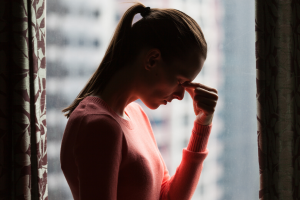It Is Possible For You to Reduce Your Stress
 It is normal to have increased anxiety right now as we learn to navigate life in the midst of the recent pandemic. Everyone is feeling this way! And if your baseline is regularly higher in anxiety or hyperarousal, this will feel like even more to you!
It is normal to have increased anxiety right now as we learn to navigate life in the midst of the recent pandemic. Everyone is feeling this way! And if your baseline is regularly higher in anxiety or hyperarousal, this will feel like even more to you!
You may be feeling more triggered than usual if you have a history of trauma. You may not understand what those triggers are yet or where they are coming from. You may just be feeling feelings so big, and those feelings may be familiar to a time in the past you have felt powerless or helpless, trapped or scared. You may crave some relief—some way to feel less badly. You may be using, or feel compelled to use, unhealthy coping mechanisms that no longer serve you.
I invite you to read more about understanding the use of unhealthy coping mechanisms with these resources:
Do You Use Drugs and Alcohol to Manage Your Emotions?
Why People With Eating Disorders Need Our Compassion
I want to remind you that you have a choice. There are many things you can’t control during a global pandemic, but there are many you can control or at least manage.
There are things that will feed or exacerbate the stress and anxiety you are feeling right now—and things you can do to reduce it.
My suggestion is to empower yourself to make choices that support your safest, calmest, healthiest self. It’s time for you to receive the nurturing you deserve!
What’s going to make the stress worse?
- Constant news intake
- Social Isolation
- Not having any alone time
- Anxiety-provoking social media
- Trying to do and know everything
- Excessive or frenzied buying
- Abandoning the tools and coping skills that you already know work for you!
Did you know there are things to make it better?
- News regulation. Check the news no more than two-three times per day: morning, noon, and night—maximum! Take it in via one sense, like reading or listening, but not both. TV news can sometimes be too overstimulating.
- Reaching out. Too much isolation can be harmful to our mental health. For those who are drawn to isolation as a coping skill, it will be important to not overdo it and to consciously make efforts to connect with others.
- Taking time for yourself. On the flip side, some people are experiencing the opposite of isolation. With children home from school, and working from home, many are not getting any time alone. It’s important to take time to regroup and breathe during the day, even if they are only in five-minute intervals. You deserve time for you!
- Noticing You. Please take the time to notice how you are feeling on the inside. Are you aware of how you are feeling physically? Are you able to slow down enough to pay attention to that? Please remember to notice you!
- Positive, hopeful social media or engaging hobbies. When it comes to social media, ask yourself, is this helpful and supportive, or anxiety-inducing? Unfollow those people or accounts that are furthering anxiety and stress—and welcome those that make you feel hopeful and resilient. Do hobbies that let you focus on something you enjoy.
- Focusing on what you can control. We can control things like following what I like to call physical distancing (versus social) and hand-washing recommendations. We can control asking an elderly neighbor if they need anything from the supermarket. Focus on these things; let everything else pass by.
- Buying just what you need. Just because people are panic-buying toilet paper doesn’t mean that you have to. Follow your gut and don’t let other people create a frenzy for you.
- Boundaries. Have boundaries to help you deal with people. Don’t be afraid to say, “I don’t want to talk about this right now.”
- Moderation. I believe that everything within moderation is where we need to be—especially when it comes to a situation like this.
- Resources. On our new COVID-19 Resource page, you will find resources designed to help you navigate calming your nervous system, understanding your fears and helping you help your children understand all that is going on, as well as how to have some fun, and much more!
Remember, we are all in this together. We will get through this together.
Remember, healing trauma happens in relationships.
And remember, compassion is a huge ally.
Let’s remember to have compassion for ourselves—and for each other. If you are having trouble and need support, a trauma-informed therapist can help.
If you’re looking for support, reach out to Brickel & Associates to learn more about our teletherapy options during the stay-at-home orders or other resources to manage stress during this stressful time.
Tags: anxiety, covid-19, self development, self-awareness, stress, stress management







